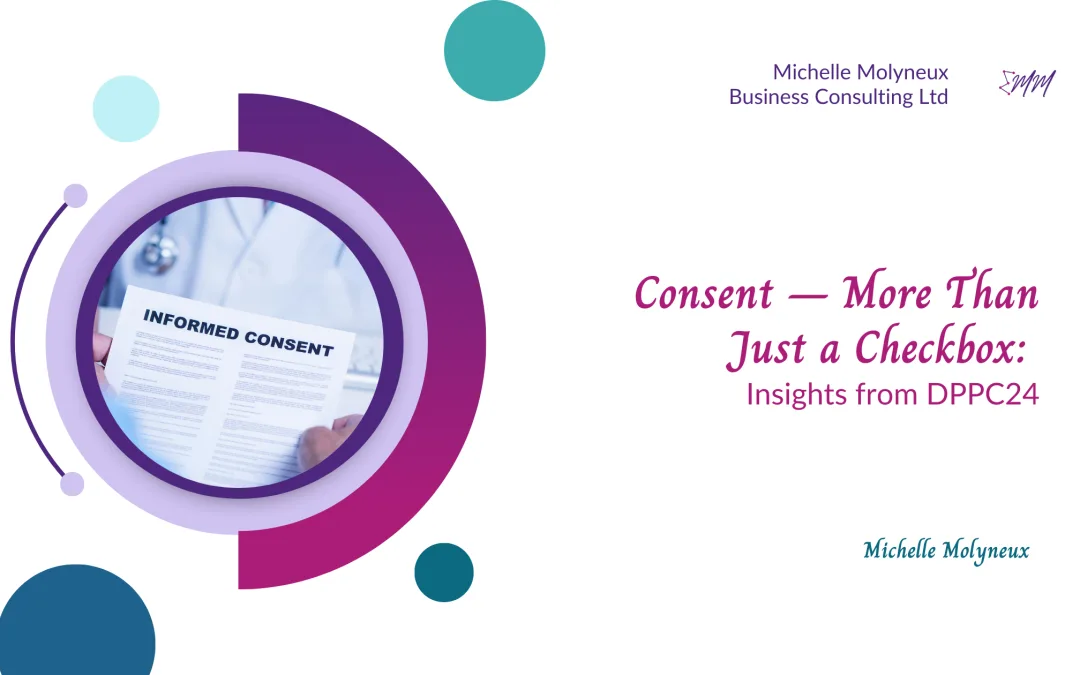Introduction
Consent is a cornerstone of data protection, often seen as a legal formality. Still, the conversation at the Data Protection Practitioners’ Conference 2024 (DPPC24) made it clear that consent needs to go beyond mere compliance. It should empower individuals, foster trust, and align with ethical data practices. In this blog, we’ll delve into the insights shared at DPPC24 about the complexities of consent and explore how organisations can make consent meaningful, transparent, and fair.
The Challenges of Obtaining Consent
The DPPC24 session on consent began with a powerful story that illustrated individuals’ social and emotional pressures when asked to provide consent. The example involved a child being asked to provide her fingerprint data for school purposes despite her family’s decision not to consent. The session highlighted how such situations can alienate individuals and make them uncomfortable, especially when alternatives are not clearly communicated.
This story exemplifies a broader issue: while consent is intended to give individuals control over their data, it often becomes a checkbox exercise in practice. Many people feel pressured to agree because they fear missing out on services or are not fully informed about their choices.
Key Barriers to Meaningful Consent
At DPPC24, several challenges to effective consent were discussed, including:
1. Lack of Awareness: Individuals often lack the knowledge needed to understand the implications of their consent in a complex data ecosystem.
2. Limited Alternatives: When refusing consent is not a realistic option, consent ceases to be truly voluntary.
3. Social Pressures: Situations where individuals feel pressured to conform, especially in public or group settings, can undermine the authenticity of consent.
4. Coercion and Obscurity: Hidden terms, confusing interfaces, and unclear language can prevent individuals from making informed decisions.
Reframing Consent: Key Takeaways from DPPC24
The DPPC24 speakers provided a framework for rethinking consent, focusing on making it a genuine engagement process rather than a compliance checkbox. Here are the key takeaways:
1. Engage Throughout the Process
Consent should not be a one-time event. Organisations must engage individuals at every stage of the data journey, from collection to deletion. This includes regularly updating them about how their data is being used and seeking renewed consent if the purpose of data use changes.
2. Respect the Decision to Withhold consent
It’s just as important to respect when consent is not given. Organisations should offer meaningful alternatives and ensure individuals are not excluded or penalised for refusing consent.
3. Design for Inclusion
Avoid processes that isolate individuals who refuse consent. For example, in the story of the child refusing fingerprinting, the school could have provided clear, accessible alternatives to ensure she didn’t feel singled out.
4. Transparency is Key
Simplify consent forms and use clear, non-technical language to explain what individuals agree to. Avoid using dark patterns or obscure language that might mislead users.
5. Empower Through Knowledge
Educate users about their rights and the consequences of their choices. Knowledgeable individuals are more likely to feel confident in their decisions, fostering trust between organisations and their stakeholders.
Practical Steps for Organisations
Based on the DPPC24 insights, here are some actionable steps organisations can take to improve their consent processes:
1. Simplify Consent Requests: Use plain language, avoid legal jargon, and clarify the purpose of data collection.
2. Offer Genuine Alternatives: Ensure individuals who refuse consent have access to alternative services whenever possible.
3. Regularly Review Consent Practices: Consent processes should be reviewed periodically to ensure they remain relevant, fair, and user-friendly.
4. Engage Stakeholders: Collaborate with users, community groups, and industry experts to develop inclusive and respectful consent practices.
5. Monitor for Bias: Regularly assess whether your consent processes are fair and free from unintended bias, ensuring no group is unfairly disadvantaged.
Why Meaningful Consent Matters
Consent is not just a compliance mechanism—it’s a way to build trust and empower individuals. As the DPPC24 session highlighted, data protection should always centre around people. By refining consent practices, organisations can create a culture of transparency and respect, ultimately strengthening their relationships with users.
Closing Thoughts
Consent is more than just a checkbox. It’s a conversation, a commitment, and an opportunity to engage meaningfully with the individuals whose data you collect and process. The insights from DPPC24 remind us that genuinely empowering individuals requires organisations to rethink their approach to consent, moving away from compliance-focused methods and towards practices that prioritise trust and transparency.
Stay tuned for our next blog in this DPPC24 series, where we’ll explore the human impact of data breaches and how organisations can adopt a more compassionate, trauma-informed approach to incident response.
Related articles:

